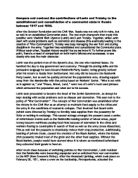He came to power with promises to get Russia out of war although it only needed a few more months until the war was won. The Bolsheviks made a total disaster by signing a separate peace settlement with Germany in Brest-Litovsk in March 1918. Not only Russia was excluded from the victors but it also had to give away much of its territory, industry, agriculture and population to the enemy. It was said, that ‘this treaty is only temporary, Russia would gain much more in an aftermath after the worldwide revolution of workers takes place’. They escaped an upcoming victory and involved their country into a war where neither side could actually win.
The Civil War broke out in the same year as the opponents of Bolsheviks united with a single common goal – to remove the Reds. And although the Reds were surrounded (since they controlled only Moscow, Petrograd and the territory that lay between), they managed to defend themselves as the Whites, Mensheviks, SR’s and others did not act as a single force while Bolsheviks had the support of 40,000 tsarist officers. Foreign intervention, made by Allied leaders suspicious of socialism in Russia, also failed because of weak offense and lack of organization.
The Red Terror, applied with will of Lenin, was a savage, cruel and inhumane destruction. The Cheka, or Secret Police, established quickly after Lenin became the leader of the country, was given an admission to follow and terminate anyone who contradicted Party’s interests. It was a very powerful weapon and a good use was made of it. The Whites did some terror as well as the Reds did, but theirs was “not so efficient”. Some estimate there were over 250,000 victims of Cheka’s activities. These must have been really bad people if creation of a better society required their sacrifices.
One of the effects of the Civil War in Russia was “war communism” policy. The industry was brought under state control, people from towns roamed in the countryside searching for food, ruble’s value was destroyed after the Bolsheviks started printing paper money accelerating hyperinflation. Requisition of grain surplus from peasants was introduced but this only deepened the crisis. The peasants began growing the least amount of grain possible to survive. Consequently, about 5 million people died of famine. Agricultural and industrial production was below all charts, making less than half the harvest and production of 1913.
NEP, or the New Economic Policy, replaced war communism in 1921. Lenin realized that some components of capitalism would stabilize economy and lead to its constant growth. Peasants were given the freedom of running their own small businesses, employing up to 20 workers and this made success, one of not many Bolsheviks’ decisions that pleaded to be correct. Although the Party’s heads introduced NEP unwillingly and with pain, admitting that their socialist principles must be forgotten during these hard times, it obviously displayed that sheer socialism is unable to function properly and that capitalism is the way from the deepest problems. However successful NEP was, we cannot assume it to be a victory of Lenin’s rule, as it undermined his principles and only helped bringing the country back on track.
After some attempts of assassination, Lenin’s health worsened day to day. A series of strokes had been hitting him since 1921 and in1923 he decided to write his will. Neither of Party’s comrades, neither Stalin nor Trotsky, Kamenev or Zinoviev, was mentioned as a proper leader in the future. Lenin even edited his testament later, describing Stalin as a man who has too much power in his hands being the General Secretary of the Party and was not very friendly with his comrades in the Party. Stalin neglected Lenin’s will and became the next leader of the Communist Party. Though he tried, Lenin did not manage to keep Stalin away from the leadership.
Lenin had plans for a bright future but his works made it only a dream. The situation seemed to be the worst at any time of Bolsheviks’ rule but kept getting worse. A civil war, famines, terror, hundreds of thousands dead and a country falling back to the past while other advancing to the future. Not only his policy didn’t trigger off a worldwide uprising of socialism but it seemed to be not more advanced than capitalism. We could say Lenin saved Russia from a huge failure adopting NEP but he only saved the country from a disaster he created himself.








